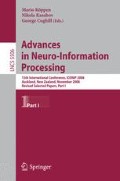Abstract
The development of cognition in humans is tightly coupled with that of language and conceptualization. It’s known that children as early as one year after birth are able to recognize the various objects as belonging to a single category. Here we report a series of experiments investigating how humans perceive the environment in terms of categorization based on the "prototype effect", studied in the literature as a characteristic feature of categorization. We focused on two parameters ("typicality" and "similarity") in the process of perceptual categorization. Using a direct rating paradigm in categorical judgment, we derived continuous parameter measures for the "typicality" and "similarity" of objects based on the subject’s estimation. The results suggest some cognitive constraints on the development of language, as it relates to the perception of sensory and motor information in the interaction with the environment.
Access this chapter
Tax calculation will be finalised at checkout
Purchases are for personal use only
Preview
Unable to display preview. Download preview PDF.
References
Eimas, P.D., Quinn, P.C.: Studies on the formation of perceptually based basic-level categories in young infants. Child Development 65, 903–917 (1994)
Quinn, P.C., Eimas, P.D.: Perceptual cues that permit categorical differentiation of animal species by infants. Journal of Experimental Child Psychology 63, 189–211 (1996)
Freedman, D.J., Riesenhuber, M., Poggio, T., Miller, E.K.: Categorical representation of visual stimuli in the primate prefrontal cortex. Science 291, 312–316 (2001)
Sudo, T., Mogi, K.: Mechanism of perceptual categorization in the pre-linguistic period. IEICE Transactions on Information and Systems E91-D(6), 1649–1655 (2008)
Lakoff, G.: Women, Fire, and Dangerous Things: What Categories Reveal about the Mind. The University of Chicago Press, Chicago (1987)
Rosch, E., Mervis, C.B.: Family resemblances: Studies in the internal structure of categories. Cognitive Psychology 7(4), 573–605 (1975)
Nosofsky, R.M.: Attention, similarity, and the identification-categorization relationship. Journal of Experimental Psychology: General 115(1), 39–57 (1986)
Minda, J.P., Smith, J.D.: Prototypes in category learning: The effects of category size, category structure, and stimulus complexity. Journal of Experimental Psychology: Learning, Memory, and Cognition 27(3), 775–799 (2001)
Johansen, M.K., Palmeri, T.J.: Are there representational shifts during category learning? Cognitive Psychology 45(4), 482–553 (2002)
Author information
Authors and Affiliations
Editor information
Editors and Affiliations
Rights and permissions
Copyright information
© 2009 Springer-Verlag Berlin Heidelberg
About this paper
Cite this paper
Sudo, T., Mogi, K. (2009). Generalization in Linguistic Category Formation Based on the Prototype Effect. In: Köppen, M., Kasabov, N., Coghill, G. (eds) Advances in Neuro-Information Processing. ICONIP 2008. Lecture Notes in Computer Science, vol 5506. Springer, Berlin, Heidelberg. https://doi.org/10.1007/978-3-642-02490-0_46
Download citation
DOI: https://doi.org/10.1007/978-3-642-02490-0_46
Publisher Name: Springer, Berlin, Heidelberg
Print ISBN: 978-3-642-02489-4
Online ISBN: 978-3-642-02490-0
eBook Packages: Computer ScienceComputer Science (R0)

